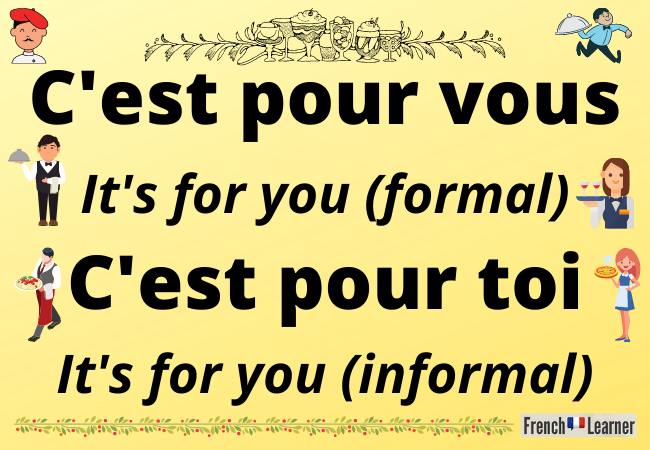
How do you say for in French?
For in French is “pour” (pronounced puʀ). For example, “C’est pour vous” (It’s for you, formal) or “C’est pour toi” (it’s for you, informal). The word pour in French has many usages, including “for” or “in order to”. This post will discover a variety of ways of saying for in French and provide several example sentences.
How to pronounce pour
Before we go any further let’s have a closer look at the pronunciation of “pour”. The “ou” sound in French is very similar to the “oo” in the English word “food”. Thus, to pronounce “pour” in French, wrap p…r around the “ou”. This page on French-Linguistics.com offers a great explanation of the pronunciation of pour.
This quick video also shows how to pronounce pour:
1) How to say “it’s for you”

One of the most common phrases you’ll need to know is when a waiter or waitress is asking “Is it for you?” in a restaurant. You will hear the waitperson say:
- Est-ce que c’est pour vous ? Is it for you?
The word est-ce que means is/are/do/does for a yes-no question. You may or may not hear this. The waiter might also simply say:
- C’est pour vous ? Is it for you?
The word vous can mean both you singular (formal) and you plural.
The waiter could also add terms of politeness. For example:
- C’est pour vous, madame ? Is it for you, ma’am?
- C’est pour vous, mademoiselle ? Is it for you, miss?
- C’est pour vous, monsieur? Is it for you, sir?
If you’re with a friend or somebody within you close group of peers, you can use the familiar “toi”.
- C’est pour toi? Is it for you? (to a friend)
This page on our site takes a close look at both tu and vous, the two words used for “you”.
2) Pendant = for + duration of past event
When expressing how along an action took or has been taking place, you can use the word pendant, which translates literally to during. It is very tempting to use “pour” in these sentences but that would be wrong. You must use pendant.
- Elle a vécu a Paris pendant trois ans. She lived in Paris for three years.
- Il a étudié le français pendant cinq ans. He studied French for five years.
3) Depuis, ca fait…que, il y a + time period = for + action still occurring
To express “for” for time duration of an action which is still occurring, you can use three synonymous forms: depuis (since), ça fait…que and il y a. Here are some examples:
- J’habite dans cette maison depuis un an. I’ve lived in this hours for one year.
- Ça fait un an que j’habite dans cette maison. I’ve lived in this hours for one year.
- Il y a un an que j’habite dans cette maison. I’ve lived in this hours for one year.
Understanding the difference between “depuis” and “pendant” to indicated “for” can be a bit confusing. heureusement (fortunately) my good friend, Alexa, a YouTube French-teaching sensation, offers a wonderful clarification in this video:
4) Pour = for, in order to
Another common usage of the word “pour” is to express “for”, “in order to” and “with the purpose of”. In these sentences, it precedes the infinitive, which is the “to” form of the verb. Here are some example sentences.
- J’achète les ingrédients pour cuisiner. I buy the ingredients for cooking.
- Nous apprenons le français pour voyager en France. We learn French for travelling in France.
5) Pour, servir à = is used for
There are two ways to express what something “is use for”. You can use both the word “pour” and the expression, “servir à”. For example:
- La scie est pour couper le bois. The saw is for cutting wood.
- La scie sert à couper le bois. The saw is used for cutting wood.
6) Pour = appropriate for
To express the idea of “for” in the context of “appropriate for”, simply use the word pour. For example:
- Ce vélo est pour un garçon. This bike is for a boy.
- Ces livres sont pour les adultes. These books are for adults.
7) Pour = intended for
In the context of “for” or “intended for” also use the word “pour”.
- Les biscuits sont pour les enfants. The cookies are for the kids.
- La pizza est pour les invités. The pizza is for the guests.
- C’est n’est pour pour toi ! It’s not for you!

8) Pour, pour ma part, à mon goût = for; opinion or liking
When expressing “for me” in the context of likes and dislikes, you pour, pour ma part and à mon goût, which translates literally to “to my taste”.
- Le concert était trop long pour moi. The concert was too long for me.
- Le concert était trop long pour ma part. The concert was too long for me.
- Le concert était trop long à mon goût. The concert was too long for me.
9) Pour = for the purchase of
When expressing “for” in the context of money paid for an item, use “pour + item name. Here are examples:
- J’ai payé huit-cent dollars pour mon vélo. I paid $800 for my bike.
- Vous avez payé cent euros pour les nouvelles chaussures. You paid €100 for the new shoes.
10) Pour, à la place de = in somebody’s place
When expressing “for + person” in the context of carrying out an actin in somebody else’s place, use both “pour” and “à la place de”. For example:
- Je ne veux pas préparer les ingrédients pour lui. I don’t want to prepare the ingredients for him.
- Je ne veux pa préparer les ingrédients à sa place. I don’t want to prepare the ingredients for him.
11) Pour, afin de = for or with the purpose of
To express “for” in the context of with or for the purpose of, you can use both “pour” and “afin de”. For example:
- J’ai acheté le fromage pour faire une pizza. I bought the cheese for making a pizza.
- J’ai acheté le fromage afin de faire une pizza. I bought the cheese for making a pizza.
12) Malgré = “for” for indicating despite
Use the word “malgré” to indicate “for” in the context of “despite”. For example:
- Malgré tous ses commentaires, c’est un bon père. Despite all his comments, he’s a good father.
13) Pour, à cause de, en raison de = for, because of
To express “for” in the sense of laying blame, you can use pour, à cause de or en raison de. Here are some examples:
- Il a eu une amende pour l’excès de vitesse. He got a fine for (because of) speeding.
- Il a eu une amende à cause de l’excès de vitesse. He got a fine for (because of) speeding.
- Il a eu une amende en raison de l’excès de vitesse. He got a fine for (because of) speeding.
14) Pour, à destination de = for + place or destination
In the context of “for a place or destination”, you can use both “pour” and “à destination de”. You can also use this construction to express “going to”. For example:
- Le train est à destination de Paris. The train is for (going to) Paris.
- Je pars demain pour Chamonix. I’m leaving tomorrow for Chamonix.

15) À + person = responsibility of
To express, “for me to + verb” or “up to me to + verb”, use the construction “à moi de + infinitive”. For example:
- C’est à moi de prendre cette decision. It’s for me to make this decision.
16) À vendre = for sale
To express “for sale”, use the expression “à vendre”. For example:
- Nous sommes désolés. La maison n’est pas à vendre. We’re sorry. The house is not for sale.
Conclusion – for in French
As you can see there are many different ways to express “for in French”. We hope these explanations have helped. Ce site est pour apprendre le français! (this is is for learning French!).
